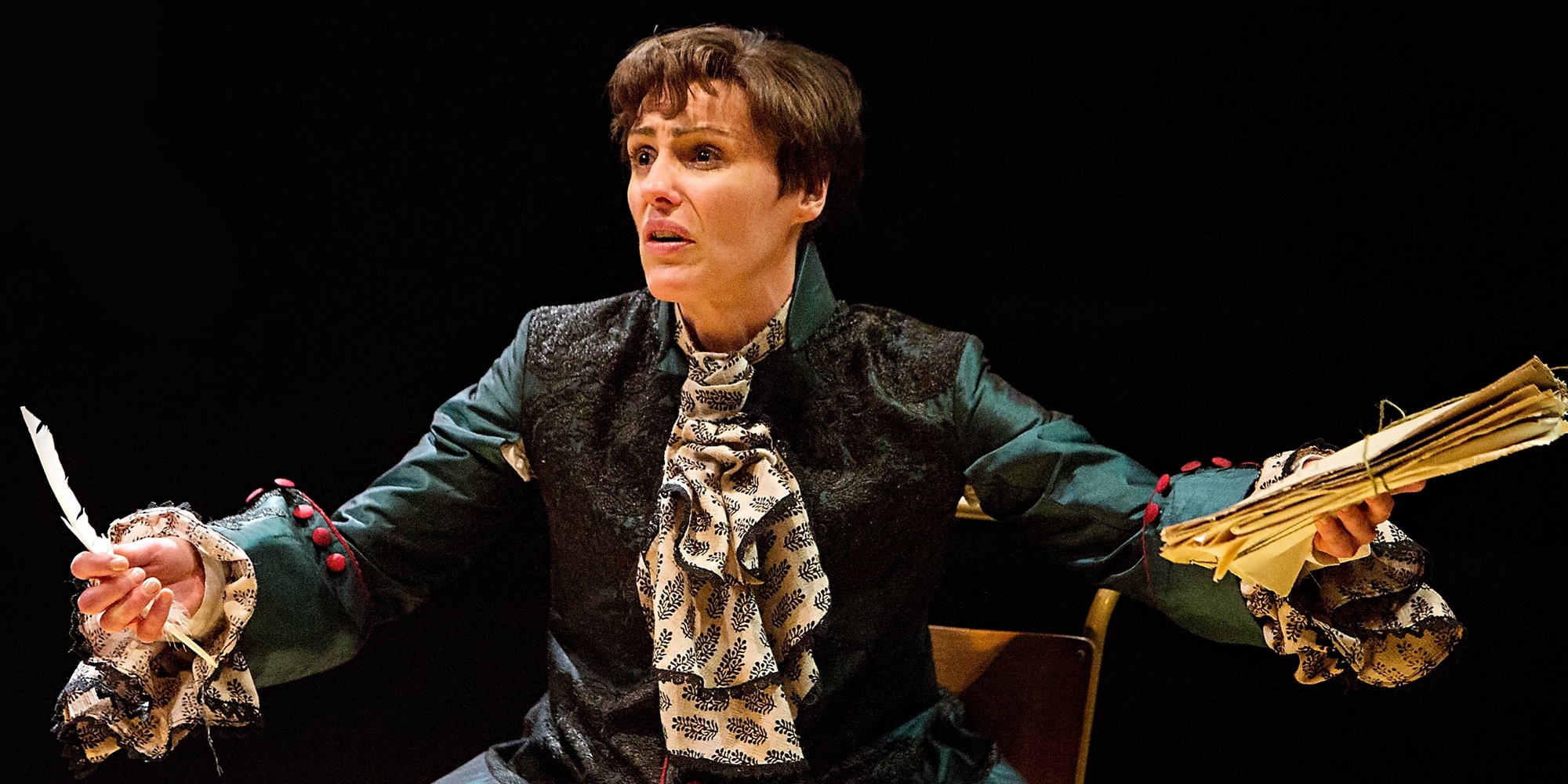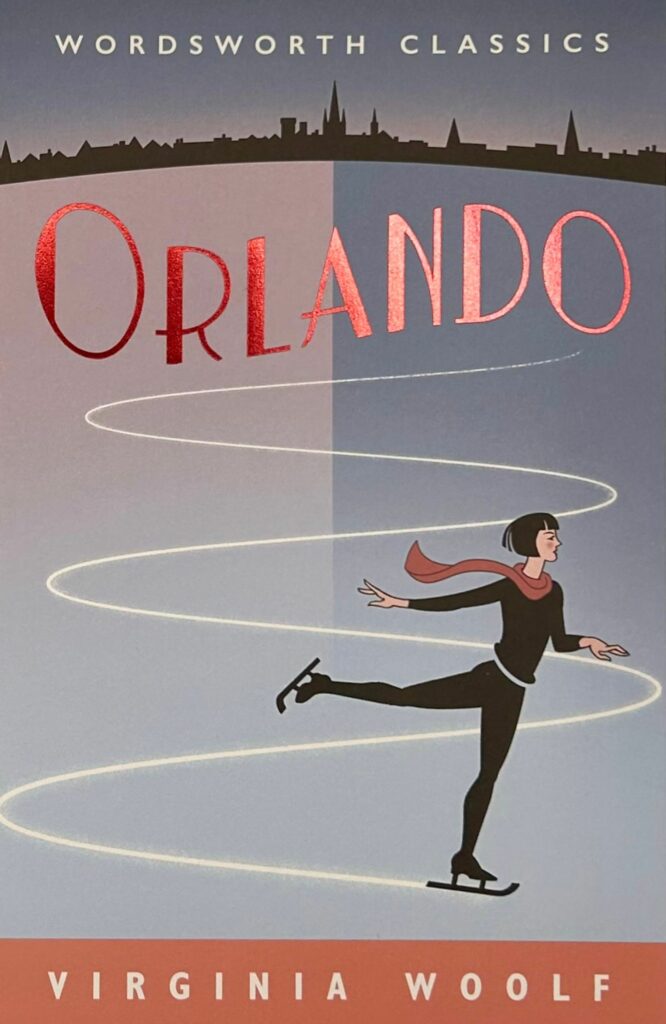
Virginia Woolf’s Orlando
A new staging of Virginia Woolf’s Orlando at the Royal Exchange, Manchester, inspires Sally Minogue to revisit the novel.
Orlando is Virginia Woolf’s hymn to unfetteredness. In it all worldly restraints are cast aside, all strictures on sexuality, desire, and the sensual apprehension of the natural world melt away; gender is unfixed from its moorings, and time itself becomes an element through which Orlando swims from century to century, immortal and infinitely open to the possible – and the impossible. For this is, of course, a fairytale, though one peculiarly rooted in actuality even as it leaps all normal human bounds. Woolf’s writing is strikingly physical, calling on all the senses. And while many of her characteristic philosophical and perceptual preoccupations are prefigured here, and the storytelling is playfully self-reflexive and arch, what tethers the book and holds the reader is the way that words enact the world, a changing world, revolving through history, but always understood through the person of Orlando him/herself.
One of the great set pieces of the ‘biography’, as Woolf subtitled it, comes in the first chapter, with a depiction of the Great Frost when, we are told, ‘the fields were full of shepherds, ploughmen, teams of horses, and little bird-scaring boys all struck stark in the act of the moment, one with his hand to his nose, another with the bottle to his lips, a third with a stone raised to throw at the raven who sat, as if stuffed, upon the hedge within a yard of him’. (15) As befits the early sixteenth century, the rural workers get the worst of it, but for the Court of the new monarch King James, the frozen Thames provides an opportunity for novel and excessive forms of play. A stretch of river is turned into a pleasure park, with the added frisson of waters still flowing deeply beneath: ‘Lovers dallied upon divans spread with sables. Frozen roses fell in showers when the Queen and her ladies walked abroad. Coloured balloons hovered motionless in the air. Here and there burnt vast bonfires of cedar and oak wood, lavishly salted, so that the flames were of green, orange and purple fire.’ This carnivalesque overturning of the normal order both echoes and permits Orlando’s mutable and mobile sexuality, as he is stricken by the sight of one of the skaters: ‘He called her a melon, a pineapple, an olive tree, an emerald, a fox in the snow all in the space of three seconds: he did not know whether he had heard her, tasted her, seen her, or all three together … When the boy, for alas, a boy it must be – no woman could skate with such speed and vigour – swept almost on tiptoe past him, Orlando was ready to tear his hair with vexation that the person was of his own sex … But the skater came closer. Legs, hands, carriage, were a boy’s, but no boy ever had a mouth like that; no boy had those breasts; no boy had eyes which looked as if they had been fished from the bottom of the sea. … She was not a handsbreadth off. She was a woman.’
Woolf conjures a world frozen in brilliance, in which love, joy, and desire (and the sense of their concomitant future loss) burn so hot that eventually, as the entrancing boy/girl Sasha sails away from Orlando’s grasp, the Thames itself suddenly and violently unfreezes: ‘Where, for three months and more, there had been solid ice of such thickness that it seemed permanent as stone, and a whole gay city had been stood on its pavement, was now a race of turbulent yellow waters’.(29) Here we meet Woolf’s familiar sense of the instability of the world, which in her more serious novels issues the tragic, with all the vividness of life rendered empty by the void that lies beneath it. In Orlando she triumphantly checkmates death and cheats the void: Orlando is not only immortal, s/he is both woman and man, living fully in the world but also standing at one side and observing and reflecting it in writing. This is a life, and a piece of writing, that never ends.
How, I wondered, as I was getting ready to go and see the Royal Exchange’s production of Sarah Ruhl’s adaptation of Orlando, [www.royalexchange.co.uk] could they possibly dramatise this most literary of works? How catch the change of centuries, which Woolf so cleverly allies to changes in the weather as well as to a host of cultural allusions? How call up the frozen world turned into a great flood or the opposingly arid and exotic climes of Constantinople? How – and the success of the play would hang on this – persuade us of Orlando’s transformation from man to woman? The answer is that they did all of this triumphantly, in that magical way that theatre can, with an imagination (Max Webster as director) to match Woolf’s writerly one at work, all the more impressive in the close confines of this theatre-in-the-round. Key to its success was motifs, in the form of music – various versions of the cello, including a baroque cello made in 1750, played atmospherically on stage to catch the shifts of scene, mood and period; fabric – brocades, silks, a hugely inflated architectural farthingale to catch both majesty and absurdity in the person of Queen Elizabeth, a handsome Russian outfit for Sasha, and Orlando him/herself reflecting the move from century to century and one gender to the other in a range of historically appropriate and engagingly seductive costumes. Wittily, the acting styles also changed with the turns of the century, while a three-man chorus brought continuity, providing both narrative voice and conduit between Orlando and the audience. The most breathtaking device was the use of a central wire which enabled Orlando and most notably Sasha to escape their terrestrial limits and swing and sway in an aerial dance which beautifully expressed the delirium of love and the transformations it brings. That set the stage for Orlando’s greater transformation; Suranne Jones, who had, as one reviewer suggested, looked at the start ‘like a young David Tennant in doublet and hose’ [Matt Trueman, theguardian.com, March 2nd, 2014], came out as a woman with the same sense of fragility and innocence as she brought to the young boy.
This production moved and amused in turns, and the aerial interplay, controlled by the actors’ bodies, and therefore always human and liable to error, brought a real sense of that danger which is the subversive undercurrent of Woolf’s ostensibly playful piece. For this is undoubtedly a naughty book, the writer’s eye cocked knowingly at her reader, and specifically at her contemporary audience. The inclusion of the photographs of her lover Vita Sackville-West in the first 1928 edition (reproduced in the Wordsworth edition) was wilfully daring, but also clever in being so overt as to silence gossip.
The Manchester production ends by bringing Orlando up to the present day, and still writing, writing, writing – on a laptop. For Orlando is also a hymn to writing, and to the power of the imagination to o’erleap itself, allowing all of us who read it to fly beyond the limits of ourselves.
Books associated with this article
